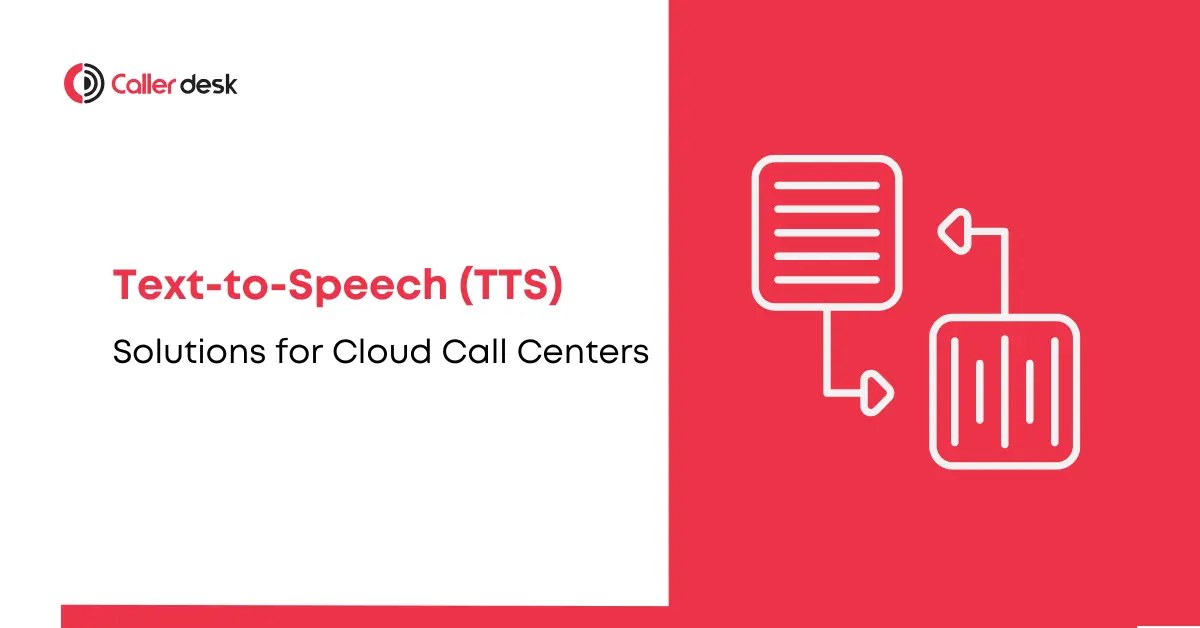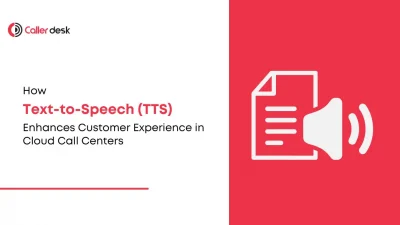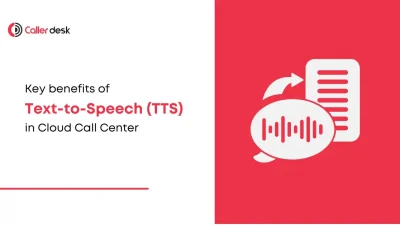Imagine your customers never having to wait for a human agent to get the answers they need, and every interaction feels as smooth and personal as a one-on-one conversation. This is the transformative power of Text-to-Speech (TTS) technology. By converting written text into natural-sounding speech, TTS is revolutionizing cloud call centers, enabling businesses to deliver faster, more efficient, and highly personalized customer experiences.
- 1 What is Text-to-Speech (TTS)?
- 2 How Do Text-to-Speech Solutions Work?
- 3 Key Features of TTS Solutions for Cloud Call Centers
- 4 Benefits of TTS Solutions in Cloud Call Centers
- 5 How TTS is Transforming Cloud Call Centers
- 6 Applications of TTS in Contact Centers
- 7 Why Choose CallerDesk for TTS Solutions?
- 8 Conclusion
- 9 Frequently asked questions
In this comprehensive guide, we’ll explore how TTS technology reshapes customer service, enhancing satisfaction, reducing operational costs, and improving efficiency—all while maintaining a human touch. Whether you’re a call center manager, business owner, or IT decision-maker, this guide will help you understand the profound impact of TTS and how CallerDesk’s solutions can meet your needs.
What is Text-to-Speech (TTS)?
Text-to-Speech (TTS) is an advanced AI-powered technology that converts written text into spoken words with a natural, human-like voice. Initially designed to assist visually impaired individuals, TTS has evolved into a vital tool for businesses, particularly in cloud call centers.
TTS systems use sophisticated algorithms to produce speech that mimics human rhythm, intonation, and pronunciation, ensuring clear and engaging communication. This technology enables businesses to create seamless customer interactions that feel personalized and professional, enhancing overall satisfaction and loyalty.
How Do Text-to-Speech Solutions Work?
TTS solutions operate using advanced machine learning algorithms and linguistic models to convert text into speech. Here’s a detailed breakdown of the process:
Step-by-Step Process
- Text Analysis: The system breaks down written text into manageable components, such as sentences, phrases, and grammar structures. It also analyzes punctuation to determine the flow of the speech.
- Linguistic Processing: Language rules are applied to decide how each word should be pronounced, including stress patterns, emphasis, and intonation. The system accounts for variations like homonyms and context-specific pronunciations.
- Acoustic Modeling: Phonemes (the basic units of sound) are mapped to their corresponding acoustic properties, such as pitch, duration, and intensity, ensuring that the speech sounds natural.
- Prosody Generation: Rhythm, tone, and stress are added to the speech, creating a natural flow that mimics human conversation. This step is essential for making the speech sound less robotic and more empathetic.
- Speech Synthesis: Finally, the system generates a continuous audio waveform, which can be played instantly for real-time communication or stored for later use.
Key Features of TTS Solutions for Cloud Call Centers
TTS technology offers a variety of features that cater to the specific needs of cloud call centers. These include:
1. Pitch Control
Adjust the tone, speed, and emphasis of the voice to suit the context of the conversation, whether formal, casual, or empathetic.
2. Multilingual and Accent Support
Serve global customer bases by providing support in multiple languages and regional accents, ensuring inclusivity and relevance.
3. Customizable Voices
Choose from male, female, or gender-neutral voices to align with your brand’s identity and customer expectations.
4. Real-Time Processing
Generate speech instantly, allowing for immediate responses during customer interactions, such as IVR prompts or live support.
5. Emotional Intonation
Add subtle emotional cues to make the speech empathetic and engaging, creating a more human-like experience.
6. Advanced Integrations
Integrate seamlessly with CRM, IVR, and analytics platforms, enabling unified operations and better data utilization.
Benefits of TTS Solutions in Cloud Call Centers
Implementing TTS technology in cloud call centers delivers numerous advantages:
1. Enhanced Customer Experience
- Personalization: Offer localized and culturally relevant interactions by customizing voices and accents.
- Empathy: Deliver empathetic communication through emotional intonations, making customers feel valued.
2. Cost Efficiency
- Savings: Automate repetitive tasks and reduce dependency on human agents, cutting operational costs by up to 70%.
- Efficient Scaling: Reduce the need for additional voice talent or recording sessions as operations grow.
3. Scalability
- Flexibility: Quickly expand operations or update prompts without the need for new recordings, ensuring responsiveness to changing business needs.
4. Faster Response Times
- Real-Time Interaction: Convert text into speech instantly, minimizing customer wait times and speeding up query resolution.
5. Consistent Brand Voice
- Uniformity: Maintain a consistent tone and quality across all customer touchpoints, reinforcing your brand identity.
6. Accessibility
- Inclusivity: Cater to visually impaired customers or those with reading difficulties, ensuring equal access to services and information.
How TTS is Transforming Cloud Call Centers
TTS technology is redefining customer service by enabling innovative and efficient communication practices. Here are key areas of transformation:
1. Enhancing IVR Systems
TTS allows IVR systems to generate real-time prompts and responses, offering a more interactive experience. Businesses can provide account updates, transaction details, and other dynamic information without relying on pre-recorded messages.
2. Automating Outbound Calls
Automate notifications, reminders, and promotional messages with TTS technology, ensuring timely and consistent communication. This enhances marketing campaigns and operational outreach.
3. Supporting Multilingual Customer Bases
TTS supports a vast array of languages and accents, enabling businesses to serve customers worldwide. This capability is crucial for global operations and expanding into new markets.
4. Streamlining Post-Call Surveys
TTS simplifies the collection of customer feedback through dynamic, personalized surveys. By offering real-time customization, businesses can improve survey participation and gather actionable insights.
Applications of TTS in Contact Centers
1. Automated Messaging
Send voice messages for appointment reminders, payment alerts, and promotional offers, ensuring effective and timely communication.
2. Real-Time Customer Support
Provide instant responses to frequently asked questions (FAQs) and routine inquiries without agent intervention, reducing workload and response times.
3. Voice-Based Marketing
Transform text campaigns into voice calls to capture customer attention and boost engagement. Voice messages are more likely to be noticed and acted upon compared to text-based communications.
4. Personalized Interactions
Create human-like interactions with tailored voice tones that reflect your brand’s personality, making customer interactions memorable and engaging.
Why Choose CallerDesk for TTS Solutions?
CallerDesk’s Unique Selling Propositions
- Advanced AI Integration: Leverage cutting-edge AI to deliver lifelike speech with emotional nuances.
- Seamless Integration: Easily integrate with CRM, IVR, and other call center systems.
- Real-Time Analytics: Gain insights into performance metrics and customer satisfaction.
- 24/7 Support: Benefit from round-the-clock customer assistance for uninterrupted operations.
- Cost-Effective Solutions: Achieve operational efficiency without breaking the bank.
Conclusion
Text-to-Speech (TTS) technology is revolutionizing cloud call centers by enhancing efficiency, reducing costs, and delivering highly personalized interactions. By converting written text into natural speech, TTS allows businesses to streamline operations, improve customer satisfaction, and maintain consistent branding across all channels.
With CallerDesk’s advanced TTS solutions, you can leverage cutting-edge AI to transform your customer service strategy. Whether enhancing IVR systems, automating outbound calls, or expanding into global markets, CallerDesk provides the tools you need to succeed.
Take the next step in transforming your call center operations. Contact CallerDesk today for a free demo and explore the transformative potential of Text-to-Speech technology!
Frequently asked questions
1. What is Text-to-Speech (TTS) technology?
Text-to-Speech (TTS) is an AI-driven technology that converts written text into spoken words with a natural-sounding voice. It uses advanced language processing algorithms to mimic human intonation, rhythm, and pronunciation, making interactions more engaging and efficient in cloud call centers.
2. How does Text-to-Speech improve customer experience in cloud call centers?
TTS enhances customer experiences by providing real-time, human-like voice responses. It allows for personalized communication in multiple languages and accents, reduces wait times, and ensures consistency across interactions, resulting in faster resolutions and higher satisfaction levels.
3. What are the main benefits of Text-to-Speech for call centers?
The key benefits of TTS technology for cloud call centers include:
Reduced operational costs by automating repetitive tasks.
Enhanced scalability for handling high call volumes.
Faster response times through real-time speech synthesis.
Improved accessibility for visually impaired customers.
Consistent brand communication across all channels.
4. Why is Text-to-Speech technology essential for global businesses?
TTS supports multiple languages and regional accents, enabling businesses to cater to diverse customer bases. It ensures culturally relevant and inclusive communication, helping global businesses expand their reach and build stronger customer relationships.
5. How does CallerDesk’s Text-to-Speech solution stand out from competitors?
CallerDesk’s TTS solution offers:
Advanced AI integration for lifelike speech.
Seamless compatibility with CRM, IVR, and analytics platforms.
Real-time processing for instant communication.
Cost-effective implementation tailored for businesses of all sizes.
24/7 customer support to ensure uninterrupted operations.
6. Can Text-to-Speech solutions be integrated with existing call center systems?
Yes, CallerDesk’s TTS solutions are designed to integrate seamlessly with your existing CRM, IVR, and analytics platforms. This ensures a smooth implementation process and unified operations across all channels.
7. How does Text-to-Speech help with outbound call campaigns?
TTS automates outbound calls by generating personalized voice messages for notifications, reminders, and promotions. This increases engagement rates and ensures timely communication without requiring manual effort from agents.
8. Is Text-to-Speech technology compliant with accessibility standards?
Yes, TTS enhances accessibility by catering to visually impaired customers or those with reading difficulties, ensuring equal access to information and services.





